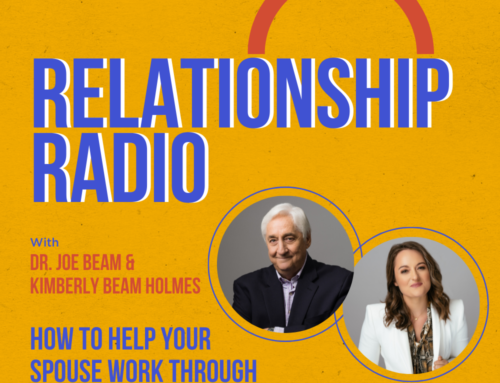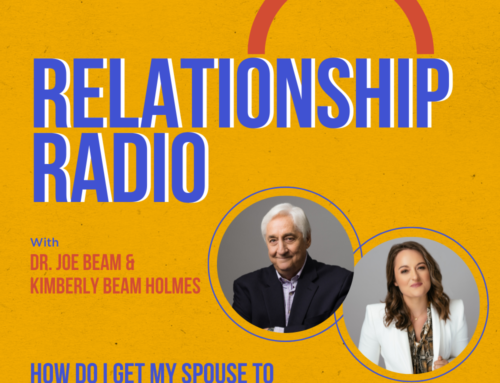How to Reconcile a Marriage: Q & A
Kimberly Holmes: We have a question from a woman who says she recently discovered her husband had an affair for a year and a half with a woman at work, but he has ended the affair. He wants to work on the marriage-and save it.
She says, “What are some techniques that can help me get over and stop overthinking what they did or talked about? I don’t want my actions or anger to hurt our future.”
A lot of times we see marriages come back together after an affair or some issue that has happened. They’ll come back together, but coming back together can lead to more problems in the marriage, because the spouse who was hurt is angry, resentful, or feeling things like that. How would you answer her question- for her not to be the problem going forward?
Dr. Joe Beam: First of all, it’s okay to be angry. It really is, but what Kimberly just alluded to (and this happens a lot) is that people tend to swallow the anger while they’re trying to get their spouse to come back. Then, when the spouse comes back and things are actually headed in the right direction, the anger comes out, it explodes, and they attack. They’re vicious sometimes. That’ll destroy it.
The Reconciliation Process As A New, Growing Relationship
It’s okay to feel the anger. It really is. It’s also okay to want your spouse to really understand what you feel, but understand when you first get back together- think about it like you’re now dating.
What I mean is this. You’re in the early stages of a new relationship with your spouse. Don’t hit him or her with the heavy stuff now. Don’t. For a while, just try to get along with each other.
Try to be at peace.
Try to enjoy each other.
Try to be able to laugh about things, or whatever it may be.
When you finally get to the point where it’s deeper, more involved; when you’ve gotten further into this new relationship, then you can say things like, “May I tell you about the pain I felt, because I just want you to understand.” It becomes very important that they understand, but they can’t hear about it right away. You need time to grow in your relationship again.
Make A Conscious Decision
What I heard from this particular woman, Kimberly, is that she’s thinking about the two of them, the husband and the lover, together. I’m assuming that she’s thinking about when they went off on picnics with each other or whatever the heck they did, that she’s picturing them having a good time. But I’m also thinking she’s probably imagining them in bed with each other. In your mind, you start comparing yourself to to the other and thinking, “How is he feeling about me? Is he thinking about her while he’s making love to me?”
So, how do you stop that? You have to do it consciously. Now I realize, sometimes it’s hard to take control of our own thoughts. I do. Maybe you want to see somebody to help you understand how to process this. A good counselor or therapist can help you do that. Our coaches, if you want to contact us and talk to our coaches, can help you think that through.
But ultimately, it is going to become a matter of willpower. It’s not just going to “poof,” disappear. You could get some medicine to calm you down. If you need that in the short term, see your physician and get it.
Ultimately it’s going to be a matter of you thinking about the good, not the bad.
You say, “What do you mean the good?”
Well, it’s over.
He picked you over her.
He sees that being with you is the place he should be, the place that he wants to be.
He wants to make a life with you.
Whenever your mind starts straying toward what he did with her and those kinds of things, take that captive. How do you do it? Start thinking to yourself like this. “He’s with me. We can make a good life together” and maybe even start daydreaming how things can be and will be if you keep doing the right things.
If you need the medicine in the short term, your doctor will know about how to do that. And, if you need counseling or therapy, find a good one. But ultimately, it’s going to come down to the fact that there’s no magic answer. You’re going to have to deal with this and focus your mind.
The Dirt-Road Effect
Kimberly Holmes: Yeah, absolutely. Not to totally geek out, but I did a little bit of research about the brain and the brain pathways, “neuron firing pathways.” Just looking at it from that point of view, I see that the more we “worry” or “fixate on certain issues and anxiety” and let that happen, it puts these certain pathways in our brain that become used to firing.
For example, your “neuron firing pathways” are like driving down a dirt road.
The more you drive down it, the more it’s going to clear the rocks out of the way. It’s going to be easier to drive down, and that becomes the one that is most used.
It’s really like “programming your brain.”
You’re starting to fire off different pathways.
You’re wanting to go more positive; wanting to think that way.
If you don’t focus on, like Joe was saying, doing those things such as being more positive, taking those thoughts out of your mind and replacing them with something else, then it’s never going to redo those pathways. The more you use that positive mindset, the easier it will become over time.
Dr. Joe Beam: The next time one comes into your head, just think to yourself, “It’s okay that I think those things. It’s human. But you know, I need to think about something else that’s going to be better for me.” Then start focusing and thinking on the other thing. I know it’s easier said than done, but it is doable.
Are you and your spouse ready to make your marriage BETTER than EVER? Get the free guide to reconciling here
To speak with a client representative, please fill out this form here.





